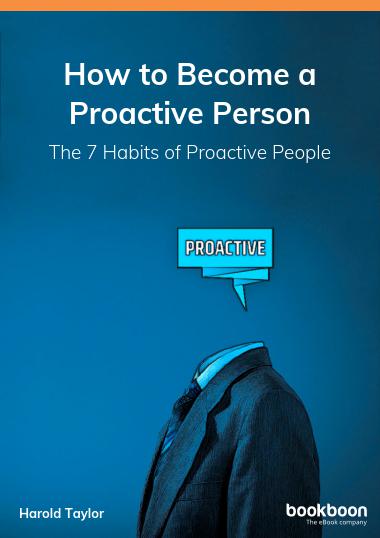Proactive means “acting beforehand.” By taking note of the past and acting in the present, proactive people assure themselves that things will go smoothly in the future.
Proactive people are not only excellent time managers, but effective leaders, because they are future-oriented, setting specific goals for every meeting and event, setting deadlines on all tasks, and scheduling time in their planners to work on the important, goal-oriented tasks and activities. They seldom appear rushed or stressed since they always allow more time than they think the activities will take, and they allow for interruptions and unforeseeable crises. Proactive people not only set deadlines for all priority tasks and projects, but they also aim to finish these commitments well before the deadlines.
One of the tools used by proactive people are checklists. They use checklists for all events or activities such as meetings, travel, conferences, sales calls, interviews and so on. Checklists save time and money, prevent errors, and ensure that nothing is missed.
These checklists are updated after each event if necessary. If anything was missed, it is added to the list so that it will not be forgotten the next time. Checklists become standing plans and allow less experienced people to perform unfamiliar tasks more easily. They can also be the basis of more detailed procedures and job descriptions.
Some checklists such as those for travel, camping trips, meetings, and so on could be purchased, but in most cases, it pays to draw up your own lists so they can be personalized for your specific activities. When you use them often, you will soon be able to prepare everything automatically without the checklist and then quickly scan the checklist to make sure you did not forget anything.
For example, you might accidently skip important information if you do not have a checklist to refer to when assigning an activity or project to an employee. So, after you have been through a few such activities and have made your notes, you may come up with a checklist such as the following.
The exact date that the employees are to assume the new responsibilities and the duration of the assignment.
- The purpose of the delegated task and how it relates to the organization’s goals.
- A detailed explanation of how the task is currently being done.
- A comment to the effect that you welcome any suggestions as to how the method can be improved.
- An explanation of the various resources and sources of information available to the employees should they encounter problems.
- A summary of the types of problems encountered in the past and how they were handled.
- An explanation of any unusual circumstances or problem areas that might arise in the future.
- The limits of their authority. Which types of decisions can they make, and which ones must be referred to a higher authority.
- Any new reporting relationships and lines of communication involved in the new assignment.
- The type and frequency of feedback expected.
- How the employees’ performance will be evaluated.
Just as you would not go shopping without a grocery list, you should not attend a meeting, networking event, performance review, sales conference and so on without referring to a checklist first to make sure you have everything you need to take with you or prepare in advance. Proactive people make checklists for all repetitive events or activities. There are other habits that proactive people have developed, and these are described in my e-Book, How to Become a Proactive Person, published by Bookboon
Successful People Read. A Lot.
What do Warren Buffett, Mark Zuckerberg, Elon Musk and Oprah Winfrey have in common? They all read - a LOT! If you want to be successful you need to read. We have over 30 short ebooks designed to get you booked up fast!


